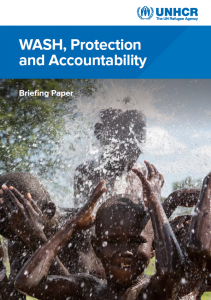
Publisher: UNHCR Year: 2017 Description: This document describes UNHCR’s five principles linking WASH, protection, and accountability. It highlights the protection and accountability challenges that relate to WASH issues in refugee contexts. The document also provides case studies to high these principles in action and a checklist that can be used for safety and security.
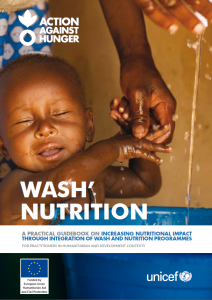
A practical guidebook on increasing nutritional impact through integration of WASH and Nutrition programmes. It is meant for practitioners in humanitarian and development contexts.
Tags: Capacity Building, Child Friendly Facilities, Cross Cutting, Excreta Management, Human Right to Water / Sanitation, Hygiene Promotion, Protection, Solid Waste Management, WASH Assessments, WASH Coordination, WASH Monitoring, WASH Programme Health and Safety, WASH Strategy Development, and Water Supply. Locations: Africa, Asia and the Pacific, Central Asia, Europe, Middle East, and South-West Asia. Languages: English. Organisations: ACF and UNICEF. Categories: WASH Policy Guidelines and WASH Reference Documents.

The UNHCR WASH Manual Part 1: Programme Guidance, provides practical guidance for WASH programmes in refugee settings.
Tags: Camp Closure, camp management, Capacity Building, CASH Interventions, Child Friendly Facilities, Cold Climates, Cross Cutting, Disability, Environment, Gender, Gender Based Violence, Human Right to Water / Sanitation, Protection, Value for Money, WASH Assessments, WASH Coordination, WASH Monitoring, WASH Programme Health and Safety, WASH Programme Management, WASH Reporting, and WASH Strategy Development. Languages: English. Organisations: UNHCR. Categories: WASH Manual, WASH Operational Guidelines, WASH Policy Guidelines, and WASH Reference Documents.
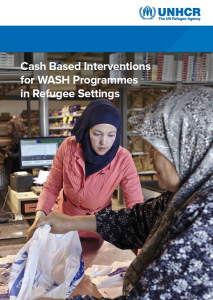
This report is based on a desk-based review of secondary data, comprising published material as well as grey literature, supplemented with key informant interviews for programmes that lacked documentation. Section One summarises the current use of CBI in WASH programming. Section Two summarises the best practices and lessons learned including challenges faced, drawing on evidence from the project examples found. Section Three provides recommendations and best practice guidance for use of CBI in refugee settings. Section Four details existing tools and guidance.
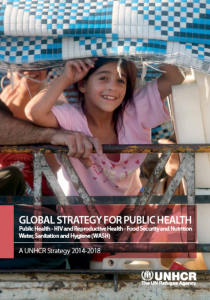
This document describes UNHCR’s global strategy for public health through a set of guiding principles and strategic approaches including protection; age, gender and diversity; equity; access; sustainability; community empowerment; appropriateness and reliability; partnerships and coordination; capacity building; communication and advocacy; integrated approaches; measurement and monitoring; and innovation. The document describes strategic objectives and enabling actions per sub-sector (Public Health, HIV and Reproductive Health, Food Security and Nutrition, and WASH).
Tags: Capacity Building, Disease Vector Control, Excreta Management, Gender, Gender Based Violence, Human Right to Water / Sanitation, Hygiene Promotion, Protection, Public Health, Value for Money, WASH Coordination, WASH Monitoring, WASH Strategy Development, and Water Supply. Languages: English. Organisations: UNHCR. Categories: WASH Guidelines, WASH Operational Guidelines, WASH Policy Guidelines, and WASH Reference Documents.
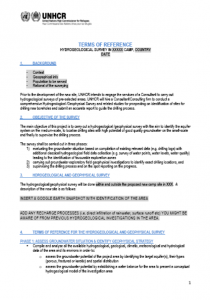
These sample terms of reference may be used should WASH actors working in refugee settings with to engage the services of a Consultant to carry out hydrogeological surveys of pre-selected areas. The terms of reference cover the following areas…
Evaluating the groundwater situation based on compilation of existing relevant data (e.g. drilling logs) with additional classical hydrogeological field data collection (e.g. survey of water points, water levels, water quality) leading to the identification of favourable exploration zones
Carrying out groundwater exploratory field geophysical investigations to identify exact drilling locations, and
Supervising the drilling process and on the spot reporting on the progress.
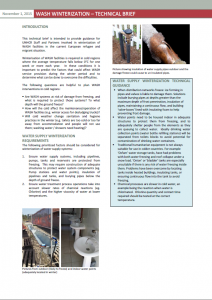
This technical brief is intended to provide guidance for UNHCR staff and Partners involved in winterization of WASH facilities in the current European refugee and migrant situation.
Tags: Bathing Facilities, Cold Climates, Cross Cutting, Excreta Management, Hygiene Promotion, Piped Water Networks, and Water Supply. Locations: Central Europe and the Baltic States, Eastern Europe, and Europe. Languages: English. Organisations: UNHCR. Categories: WASH Emergency Guidelines, WASH Emergency Tools, WASH Guidelines, WASH Operational Guidelines, WASH Policy Guidelines, and WASH Reference Documents.
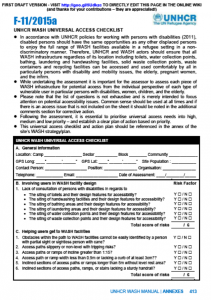
This document has been designed to help UNHCR and WASH actors assess WASH infrastructure for potential access from the individual perspective of each type of vulnerable user in particular persons with disabilities, women, children, and the elderly.
Tags: Bathing Facilities, Communal Toilets, Cross Cutting, Disability, Laundering Facilities, WASH Assessments, WASH Monitoring, WASH Programme Management, WASH Strategy Development, and Water Supply. Languages: English. Organisations: UNHCR. Categories: WASH Blank Forms, WASH Operational Guidelines, WASH Policy Guidelines, and WASH Reference Documents.
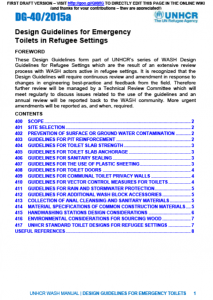
This document contains guidelines for toilets in refugee settings including: site selection; prevention of surface or ground water contamination; pit reinforcement; toilet slab strength; toilet slab anchorage; sanitary sealing; use of plastic sheeting; toilet doors; privacy walls; vector control measures; rain and stormwater protection; wash block accessories; collection of anal cleansing and sanitary materials; material specifications; handwashing stations design considerations; and environmental considerations for sourcing wood .
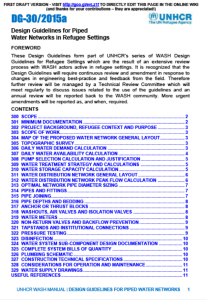
This document contains guidelines to help UNHCR and WASH actors design piped water networks in refugee settings. It describes the minimum documentation that should be included for a water network design project.
Tags: Piped Water Networks, WASH Monitoring, WASH Programme Management, WASH Strategy Development, Water Pumping, Water Storage, and Water Supply. Languages: English. Organisations: UNHCR. Categories: WASH Design Guidelines, WASH Guidelines, WASH Policy Guidelines, WASH Reference Documents, and WASH Technical Designs.
 English
English










